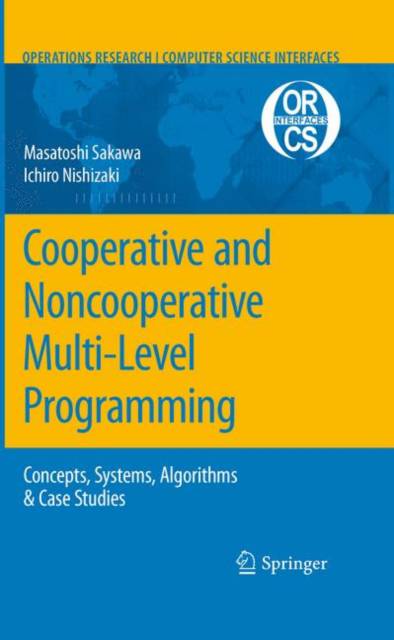
Bedankt voor het vertrouwen het afgelopen jaar! Om jou te bedanken bieden we GRATIS verzending (in België) aan op alles gedurende de hele maand januari.
- Afhalen na 1 uur in een winkel met voorraad
- In januari gratis thuislevering in België
- Ruim aanbod met 7 miljoen producten
Bedankt voor het vertrouwen het afgelopen jaar! Om jou te bedanken bieden we GRATIS verzending (in België) aan op alles gedurende de hele maand januari.
- Afhalen na 1 uur in een winkel met voorraad
- In januari gratis thuislevering in België
- Ruim aanbod met 7 miljoen producten
Zoeken
€ 181,95
+ 363 punten
Uitvoering
Omschrijving
To derive rational and convincible solutions to practical decision making problems in complex and hierarchical human organizations, the decision making problems are formulated as relevant mathematical programming problems which are solved by developing optimization techniques so as to exploit characteristics or structural features of the formulated problems. In particular, for resolving con?ict in decision making in hierarchical managerial or public organizations, the multi level formula tion of the mathematical programming problems has been often employed together with the solution concept of Stackelberg equilibrium. However, weconceivethatapairoftheconventionalformulationandthesolution concept is not always suf?cient to cope with a large variety of decision making situations in actual hierarchical organizations. The following issues should be taken into consideration in expression and formulation of decision making problems. Informulationofmathematicalprogrammingproblems, itistacitlysupposedthat decisions are made by a single person while game theory deals with economic be havior of multiple decision makers with fully rational judgment. Because two level mathematical programming problems are interpreted as static Stackelberg games, multi level mathematical programming is relevant to noncooperative game theory; in conventional multi level mathematical programming models employing the so lution concept of Stackelberg equilibrium, it is assumed that there is no communi cation among decision makers, or they do not make any binding agreement even if there exists such communication. However, for decision making problems in such as decentralized large ?rms with divisional independence, it is quite natural to sup pose that there exists communication and some cooperativerelationship among the decision makers.
Specificaties
Betrokkenen
- Auteur(s):
- Uitgeverij:
Inhoud
- Aantal bladzijden:
- 250
- Taal:
- Engels
- Reeks:
- Reeksnummer:
- nr. 48
Eigenschappen
- Productcode (EAN):
- 9781441906755
- Verschijningsdatum:
- 1/07/2009
- Uitvoering:
- Hardcover
- Formaat:
- Genaaid
- Afmetingen:
- 156 mm x 234 mm
- Gewicht:
- 544 g

Alleen bij Standaard Boekhandel
+ 363 punten op je klantenkaart van Standaard Boekhandel
Beoordelingen
We publiceren alleen reviews die voldoen aan de voorwaarden voor reviews. Bekijk onze voorwaarden voor reviews.









